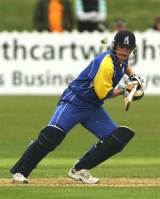Who needs specialists?
Regardless of the format, the best players will be the best - as the composition of the teams at the World Twenty20 has shown. By Andrew McGlashan
Andrew McGlashan
18-Sep-2007
|
|

|
Whatever success a player has in domestic cricket, it is in the international game that the men are sorted from the boys. The Test arena is the ultimate proving ground, where skills have to be applied over five days and hundreds of overs; to a lesser extent, the ODI scene is unforgiving on anyone who doesn't come up to scratch. A week ago the question was: would the ICC World Twenty20 be any different, or could some unknown specialists take the limelight? A quick rundown of some of the on-field highlights suggest not.
Chris Gayle hit the first century, Brett Lee claimed the first hat-trick, Sanath Jayasuriya is playing like he did at the 1996 World Cup (and has been for many years since), and Daniel Vettori is tweaking his left-arm spin with plenty of guile. Most of the match-winning performances have come from familiar names. Even Brendan Taylor, who
guided Zimbabwe to their famous victory over Australia, was one of their most established youngsters.
With little in the way of experience to fall back on, most sides brought their best players to South Africa and have let them learn on the move. India have only one player, Dinesh Karthik, from the Tamil Nadu side that won the Inter-State Twenty20. Pakistan's nod to domestic efforts is only slightly stronger: Fawad Alam was the leading run-scorer and wicket-taker in their Twenty20 Cup, and Misbah-ul-Haq had an average of 113 in the tournament.
New Zealand, never afraid to tinker in one-day cricket, considered giving the wicketkeeping gloves to Gareth Hopkins and allowing Brendon McCullum to open the batting, but shelved that idea before the group stage. The closest they have to a Twenty20 specialist is McCullum's brother Nathan, an offspinner who averaged 12 in the State Twenty20 last year. He hasn't had a game yet.
South Africa, building on home advantage, packed their squad with young, vibrant pace-bowling allrounders. There was no room for Jacques Kallis and Andrew Hall; instead Albie Morkel and Johan van der Wath were in. With three wins out of three, the decisions have paid off.
However England, the country that gave the game Twenty20, went back into the county ranks to pluck out a host of players - Darren Maddy, James Kirtley, Jeremy Snape, Chris Schofield, Luke Wright and Vikram Solanki - based on domestic success. On the face of it there doesn't seem much difference between their approach and South Africa's, but crucially, the first four of the England names clearly fall into the bracket of 'Twenty20 specialists'.
None of them are part of England's ODI squad that begins a one-day series against Sri Lanka on October 1, but it is highly likely that Morkel and van der Wath will be featuring for South Africa in Pakistan at the same time. Only one player in South Africa's 15-man squad, Gulam Bodi, could be considered a specialist in the Maddy or Snape role and he is yet to play a game.
When England's squad was selected, there was a mixed reaction to their punt on players who had previously been discarded at international level for not being up to the challenge. Some thought it was worth the gamble, others that it was bound to unravel. The latter group is winning at the moment; only Schofield has been anything near a success so far.
In defence of the selectors, England hadn't beaten India 4-3 when the Twenty20 party was named, and Ian Bell hadn't emerged as a top-class No. 3. Bell's place probably went to Maddy, who earned his call (or recall) seven years after his last ODI by scoring 1312 runs, at 32, with a strike-rate of 134, in the five domestic seasons of Twenty20. But after two games at the World Twenty20 Maddy has been dropped, following a struggle similar to the one he had when he first tasted the international level in 1999.
Kirtley's comeback - albeit limited to one over against Australia - was even more unrewarding: he was dispatched for 17.
|
|

|
Snape is the template for a Twenty20 specialist as he doesn't play first-class cricket for Leicestershire anymore. But he, too, was given a solitary over against South Africa (although he did have two catches dropped).
After the English Twenty20 finals day in August, a couple of days before England named their squad, Robert Key, captain of the winning Kent team, said something that has become unnervingly prophetic. "You have to have a bit of class as well. If some of these Twenty20 specialists bowl at Matt Hayden, he is probably going to hit them, big as the ground is.
"Can you play against a bowler who is sending it down at 90mph? Can you hit him out of the park? Some people are good at smacking military-medium, but at the top level you have to be able to do it against the best."
Australia, always the benchmark, have overcome their loss to Zimbabwe and are now finding top gear with only a couple of changes from their World Cup squad. Brett Lee has come in for the retired Glenn McGrath and Ben Hilfenhaus for the injured Shaun Tait. They happen to have the leading run-scorer in Twenty20 history, Brad Hodge, a high-quality batsman who has adapted to the game.
But it shouldn't really come as a surprise that international Twenty20 is proving a harsh reality. There have not been many players who have been successful solely in ODIs over a long period of time, and unable to transfer their skills to Test matches. It doesn't seem to matter how much you shrink the game, the best players remain the best.
Andrew McGlashan is a staff writer on Cricinfo